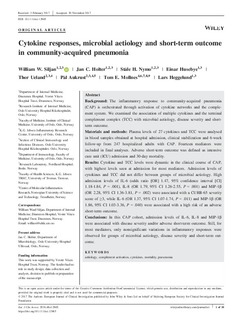| dc.contributor.author | Siljan, William Ward | |
| dc.contributor.author | Holter, Jan Cato | |
| dc.contributor.author | Nymo, Ståle Haugset | |
| dc.contributor.author | Husebye, Einar | |
| dc.contributor.author | Ueland, Thor | |
| dc.contributor.author | Aukrust, Pål | |
| dc.contributor.author | Mollnes, Tom Eirik | |
| dc.contributor.author | Heggelund, Lars | |
| dc.date.accessioned | 2018-03-08T16:48:19Z | |
| dc.date.available | 2018-03-08T16:48:19Z | |
| dc.date.created | 2018-02-21T10:14:08Z | |
| dc.date.issued | 2017 | |
| dc.identifier.citation | European Journal of Clinical Investigation. 2018, 48 (1). | nb_NO |
| dc.identifier.issn | 0014-2972 | |
| dc.identifier.uri | http://hdl.handle.net/11250/2489596 | |
| dc.description.abstract | Background
The inflammatory response to community-acquired pneumonia (CAP) is orchestrated through activation of cytokine networks and the complement system. We examined the association of multiple cytokines and the terminal complement complex (TCC) with microbial aetiology, disease severity and short-term outcome.
Materials and methods
Plasma levels of 27 cytokines and TCC were analysed in blood samples obtained at hospital admission, clinical stabilization and 6-week follow-up from 247 hospitalized adults with CAP. Fourteen mediators were included in final analyses. Adverse short-term outcome was defined as intensive care unit (ICU) admission and 30-day mortality.
Results
Cytokine and TCC levels were dynamic in the clinical course of CAP, with highest levels seen at admission for most mediators. Admission levels of cytokines and TCC did not differ between groups of microbial aetiology. High admission levels of IL-6 (odds ratio [OR] 1.47, 95% confidence interval [CI] 1.18-1.84, P = .001), IL-8 (OR 1.79, 95% CI 1.26-2.55, P = .001) and MIP-1β (OR 2.28, 95% CI 1.36-3.81, P = .002) were associated with a CURB-65 severity score of ≥3, while IL-6 (OR 1.37, 95% CI 1.07-1.74, P = .011) and MIP-1β (OR 1.86, 95% CI 1.03-3.36, P = .040) were associated with a high risk of an adverse short-term outcome.
Conclusions
In this CAP cohort, admission levels of IL-6, IL-8 and MIP-1β were associated with disease severity and/or adverse short-term outcome. Still, for most mediators, only nonsignificant variations in inflammatory responses were observed for groups of microbial aetiology, disease severity and short-term outcome. | nb_NO |
| dc.language.iso | eng | nb_NO |
| dc.publisher | Wiley | nb_NO |
| dc.rights | Navngivelse-Ikkekommersiell 4.0 Internasjonal | * |
| dc.rights.uri | http://creativecommons.org/licenses/by-nc/4.0/deed.no | * |
| dc.title | Cytokine responses, microbial aetiology and short-term outcome in community-acquired pneumonia | nb_NO |
| dc.type | Journal article | nb_NO |
| dc.type | Peer reviewed | nb_NO |
| dc.description.version | publishedVersion | nb_NO |
| dc.source.volume | 48 | nb_NO |
| dc.source.journal | European Journal of Clinical Investigation | nb_NO |
| dc.source.issue | 1 | nb_NO |
| dc.identifier.doi | 10.1111/eci.12865 | |
| dc.identifier.cristin | 1567274 | |
| dc.relation.project | Norges forskningsråd: 223255 | nb_NO |
| dc.description.localcode | © 2017 The Authors. European Journal of Clinical Investigation published by John Wiley & Sons Ltd on behalf of Stichting European Society for Clinical Investigation Journal Foundation This is an open access article under the terms of the Creative Commons Attribution-NonCommercial License, which permits use, distribution and reproduction in any medium, provided the original work is properly cited and is not used for commercial purposes. | nb_NO |
| cristin.unitcode | 194,65,15,0 | |
| cristin.unitname | Institutt for klinisk og molekylær medisin | |
| cristin.ispublished | true | |
| cristin.fulltext | original | |
| cristin.qualitycode | 1 | |

